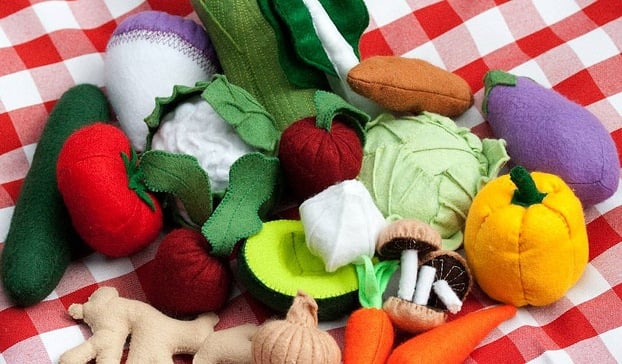A Beginner’s Guide to Healthy Eating
Do you suck at eating?
Maybe your doctor told you that you need to lose weight. Maybe you’re sick and tired of being the self-deprecating big guy/girl in your group of friends. Maybe you just had your first kid and realized you need to be there for him growing up. Maybe you woke up this morning, looked in the mirror, and finally came to the realization that it’s time to start taking care of yourself.
Whatever your reason is for wanting to make a change, you’re not alone! Every day, thousands of people make the decision to start eating better and losing weight…and every day those thousands of people don’t really have any plan or idea what they’re doing.
After all, there are so many freaking decisions to be made:
- Should I follow the food pyramid?
- Should I be counting all of my calories?
- What about “heart healthy” whole grains?
- Should I do this juice diet all of my coworkers are on?
- How many Twinkies can I fit in my mouth?
Fear not, for perfect Fitness is here! (This is where the perfect Fitness theme song would play…if we had one).
Today you’re going to learn the basics of a healthy diet so you can stop sucking and start living better. This is a relatively long article (3500+ words), so feel free to wait until you’re on you’re lunch break to really dig in…or just shun your work for the next 30 minutes and enjoy. Tell your boss you’re leveling up your life…he’ll understand.
Combine these diet tips with a fun strength-building routine and you’ll be shouting “THIS IS SPARTAAAAAAA!!!” in no time…or whatever else you prefer to yell while kicking people down bottomless wells.
Note: the diet advice here is an abridged version of the diet philosophies that I present in the different Rebel Guides for sale from 'NF'- diets and what to eat can be some of the most controversial topics out there, so this information is based on my personal research, philosophy, and results along with the results of the members of the Perfect Fitness community who have followed similar guidelines.

If I had to break down the Perfect Fitness Diet into a single sentence, it would go something like this:
“You’re smart and you know what real food is, so stop eating crap.”
You know what real food is: things that grew in the ground, on a tree, came out of the sea, ran on the land, or flew through the air. Meat, fish, eggs, vegetables, fruits, nuts are all great examples of REAL food.
On top of that, you know what crap food is: food that comes from a drive-thru window, a vending machine, box, bag, or wrapper. If it has an ingredient list longer than A Game of Thrones, it’s probably not good for you. If it started out as real food and then went through fourteen steps to get to the point where you’re about to eat it, it’s probably not good for you.
Use this information and combine it with this mantra: “you can’t outrun your fork“. When trying to lose weight, feel healthy, and get in shape, 80% (not an exaggeration) of your success or failure will come from how well you eat – which is why this point is one of the cornerstones of the Rebellion.

Eat more real food, you must. Eat less junk food, you will.
I realize this concept is nothing new or revolutionary, but up until now the ability to actually DO IT has eluded you for some reason – your heart wasn’t in it, you got sick, went on vacation, got bored, or just decided that you couldn’t live without certain foods (SPOILER ALERT: you can).
I am NOT a fan of “diets”, detoxes, juice cleanses, or crash-fads that result in vast fluctuations in your body weight and health. These are the useless solutions that are sold to you in pill form, in MIRACLE DIET INFORMATION ads online, and in super expensive health food stores.
You are smarter than that.
Want to know what I am a fan of? Small changes that produce big results, like my boy Optimus Prime. You need to determine for yourself how likely you are to succeed depending on how many changes at once you can deal with: Some people can radically adjust everything they eat overnight and have no adverse effects. Other people wouldn’t dream of giving up certain foods and the second they go more than a few days without it they become Crankenstein.
That choice is yours. You need to determine:
- How averse are you to change?
- How much weight you think you need to lose?
- How quickly you need to lose that weight? (wedding? honeymoon? vacation?)
- How likely are you to stick with your changes?
Like playing a video game, you need to determine what level of difficulty you’re up for. Sure playing on Difficult gives you less room for error, but it also hones your skills far more quickly and produces more impressive results. Or maybe you’re cool with playing on easy, because you don’t have to be as neurotic and can have more fun with it.
Decide what method works best for you based on how radical of a change you’re chasing. Just don’t overdo it – small permanent successes will beat out massively ambitious failures 100 times out of 100.
If you are just eating better because somebody told you to or because you think you should (but don’t really have a real reason)…every day that you deprive yourself of your favorite foods will seem like torture – you’re going to fail miserably.
Instead, look at the changes you’re making to your diet as small steps on the path to a leveled up live. You’re not depriving yourself of junk food because you want to suffer, but rather because you want a better life, a happier existence, and/or because you want to set a good example for your children.
nothing tastes as good as looking good feels.”
It’s time to give up that instant gratification you get from eating a donut, a bag of chips, or six slices of pizza.
You are not a slave to your taste buds.
As we’ve learned from the Matrix, you DO have a choice – stop letting the food companies, who have all designed these crappy foods for maximum addictiveness, hold you hostage.
Free your mind, free your taste buds.
[I can't believe I just typed that. Wait, yes I can.]
We’re not looking for instant gratification. We’re looking for a long life full of epic winning.
Eating for dummies

Okay! You’re finally ready to start making some changes, but you’re not quite sure what you’re going to change or how you’re going to change it. Hopefully you passed basic math back in the day; if you didn’t and you made it this far in life…I’m not even mad, I’m impressed. Anyhoo, remember this basic equation:
- One pound of fat = 3500 calories
If we do some complex synergistic rocket geometric algebra here, we can determine that 3500/7 = 500.
That means that if you are interested in losing ONE pound per week, you need to be eating 500 less calories per day (or burning 500 calories more per day). Optimally, your 500 calorie deficit per day would come from a combination of increased exercise and decreased calorie intake, but lets just say for today that you’re going to focus on eating 500 less calories per day.
“But Steve, how do I do that?”
Great question, thank you so much for asking!
I HIGHLY recommend you spend the next three to four days tracking your calorie intake. And when I say track them, I mean track EVERY FREAKING THING YOU EAT. Yeah, those handful of M&M’s you stole off of Milton’s desk at work count. So does that half can of coke you found in your back seat cupholder from last June. So does the handful of french fries you stole from Richard while he was in the bathroom at KFC.
Every.
Single.
Calorie.
If you are wondering how many calories you SHOULD be eating, calculate your Basal Metabolic Rate here, and then adjust for how active you are.
Now, if you are used to eating 4,000 calories a day, switching to 2,000 per day will probably make you want to gnaw your arm off – instead, slowly decrease your calorie intake by a few hundred calories each week. Think of your stomach like a muscle that needs to be trained – it needs to learn that it can function and operate on way less food than you’ve been giving it.
This is the easiest method of weight loss – you still get to eat all of the same foods, you just have to adjust how much you are eating. Unfortunately, this method also produces the least optimal healthy results in my opinion, but it’s a great place for a newbie to start taking control of his/her eating.
Quality of Calories

Once you’ve learned how many calories you’re consuming, you might start to see a few pounds disappear, but its just a step in the right direction. Hopefully this won’t come as a shock to you, but 2000 calories worth of gingerbread cookies doesn’t fuel your body the same way 2,000 calories of meat, vegetables, and fruit would.
Not all calories are created equal!
Your body digests certain types of nutrients differently, using them for all sorts of bodily functions: building muscle, transporting nutrients, fueling various organs or muscles, or storing energy as fat for later use. Let’s take a look at how to compose a basic meal:
Protein: When you exercise, your muscles are broken down and then use protein to rebuild themselves stronger while recovering. Protein absolutely NEEDS to be a main component of every meal. Aim for one gram per pound (two grams per KG) of lean body weight, or just do one gram per pound of body weight if you don’t want to do the math – with an upper limit of 200 grams. Sources of protein include chicken, eggs, beef, pork, fish, nuts, legumes, quinoa, and most dairy products.
Carbohydrates: When you eat carbohydrates, they get converted to glucose (sugar) in your system, which is then used to provide energy for all sorts of body functions to take place. Vegetables and/or fresh fruit are quality sources of carbohydrates, with grains being less so in my opinion…but we’ll get to more grains later. There are certainly bad carbohydrates (processed carbs, refined grains, and more), and those are the ones we want to avoid. Unless you’re a marathon runner, you can function with WAY less carbs than you’re probably consuming now.
Fat: Fat is easily the most misunderstood macro-nutrient in your diet; long story short: fat is absolutely critical to your body and should make up a BIG portion of your daily calories. Things like avocados, almonds, olive oil, walnuts, and almond butter are great sources of healthy fat (polyunsaturatured and monounsaturated). If you take this stance on saturated fat (personally, I do), then full fat milk, coconut milk, and fatty cuts of meat will provide you with sources of saturated fat.
The first thing I want to make sure you know is that the fat in your food is not what made you fat. It wasn’t until the past 40-50 years that poor fat was suddenly vilified (after a few scientific leaps of faith with no real evidence ot back it up), which is why every “healthy” food these days is “low fat” or “fat free!” Not surprisingly, our country is fatter and more unhealthy than ever, and yet people still avoid fat at all costs and consume more “healthy whole grains!” (ugh).
So what IS making us fat? Simple, refined, and/or processed carbohydrates! Rather than spend thirty minutes typing it out, I’d recommend instead that you spend three minutes to watch this video to show WHY excessive carbohydrate consumption can make you fat:
0 comments:
Post a Comment